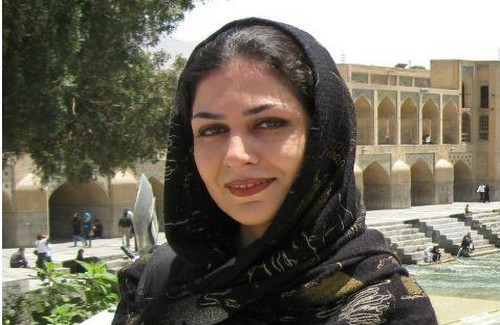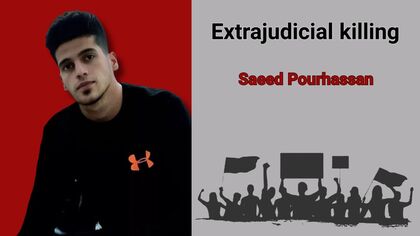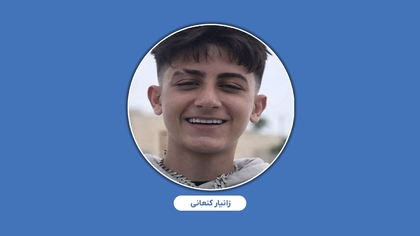Jailed Iranian activist gets human rights award
14:55 - 10 March 2012

KURDPA - The Harald Edelstam Foundation presents the name of the Laureate of the first Edelstam Prize, Mrs. Bahareh Hedayat. She has dared to play a leading role in the student\'s movement as in the women\'s rights movement in Iran, and has been an active critic of Iran\'s regime and President Ahmadinejad. The Laureate has faced severe police brutality and has been arrested repeatedly for her courageous actions, and is today a political prisoner in the feared Evin Prison in Tehran.
\"Bahareh has shown a great amount of civic courage. It is tragic that she will not be able to come and receive the prize in Stockholm on the 16th of April, due to the regime\'s punishment for her convictions. It is a great tragedy that a young, vital and freedom-loving woman shall pay such a high price for her courageous actions and in defending others and the civil rights. Battery, torture and prostration is part of her everyday-life in the Evin Prison, says Ms. Caroline Edelstam, Chair of the international Edelstam Prize Jury and Vice President of the Harald Edelstam Foundation.
The Edelstam Prize is an international prestigious prize, awarded for outstanding contributions and exceptional courage in standing up for one\'s beliefs in the Defence of Human Rights. The Prize will be awarded during a ceremony in the House of Nobility in Stockholm on the 16th of April. The Edelstam Prize is named after, and awarded in the memory of, the Swedish diplomat and Ambassador, Harald Edelstam, also called the \"Black Pimpernel,\" who distinguished himself as diplomat by his professional competence, his bravery and his civic courage in the fight for Human Rights.
The Edelstam Prize Jury\'s motivation to give Mrs. Bahareh Hedayat the Edelstam Prize is: \"Mrs. Bahareh Hedayat has through her outstanding courage and commitment to justice actively worked against the violation of the Human Rights in Iran. Despite of serious warnings and threats from the regime\'s security and intelligence forces, she has repeatedly risked her own life and freedom when defending the Human Rights. She has been arrested upon several occasions, and is imprisoned right now for these reasons. The Harald Edelstam Foundation considers her a prisoner of conscience, and in consequence respectfully asks the authorities of the Republic of Iran to set her free.\"
\"Bahare has acted in my grandfather\'s spirit and shown a great amount of civic courage, which we hope can inspire others. It is impressive that so many brave persons, aware of the risks they take, still stubbornly are willing to act in order to defend people who are victims of the violations of Human Rights. It gives us hope for a better world where we all can enjoy equal and human rights,\" says Caroline Edelstam, granddaughter to Ambassador Harald Edelstam and Co-Founder and Vice President of the Harald Edelstam Foundation.
Mrs. Bahareh Hedayat was born in Iran in 1981.As the secretary of Women\'s Commission of the Student Union, she issued a call and participated in a peaceful protest against the discriminatory laws against women. As a result she was arrested for the first time. Mrs. Bahareh Hedayat continuously reported cases of abuse of Human Rights in the universities in Iran to different human rights organizations. These reports among other things involved cases of rape of female university students. She was actively involved in the investigation of the legal situation of students who were arrested or expelled from universities and denied the right to continue their education only because of their civil rights and students\' rights activism. Despite of warnings and threats from the security and intelligence forces and even actual detention, she continued her activism and organized several meetings and seminars on various subjects on human rights, took part in a sit-in in front of the Amir Kabir University to protest the unwarranted detention and torture of students and also participated in a peaceful assembly of the family of the political prisoners in front of the Evin prison.
\"However, I would like to stress that Bahareh has been under extreme pressure from the security forces as well as the judiciary to petition for forgiveness and amnesty by expressing regret about her past activities and positions. She has bravely refused to accept this precondition for her release. However, she has from the beginning requested the case to be considered by an unbiased court,\" says Caroline Edelstam.
In 2009, Bahareh was sentenced to nine and half years punitive imprisonment. She was charged with propaganda against the regime for her interviews with the foreign press, insulting the Leader (Vali Faqih), insulting the President, acting against national security by participating in social and public gathering, and helping organize group protest. For extended periods of time during this period, she has been deprived of all her basic rights such as the right to have a lawyer, telephone conversations with her family, or meeting with visitors. Bahareh has suffered from gallstone while in prison, and now the doctors have confirmed she has kidney stone, however, she has not been given permission to be treated.
\"Bahareh has shown a great amount of civic courage. It is tragic that she will not be able to come and receive the prize in Stockholm on the 16th of April, due to the regime\'s punishment for her convictions. It is a great tragedy that a young, vital and freedom-loving woman shall pay such a high price for her courageous actions and in defending others and the civil rights. Battery, torture and prostration is part of her everyday-life in the Evin Prison, says Ms. Caroline Edelstam, Chair of the international Edelstam Prize Jury and Vice President of the Harald Edelstam Foundation.
The Edelstam Prize is an international prestigious prize, awarded for outstanding contributions and exceptional courage in standing up for one\'s beliefs in the Defence of Human Rights. The Prize will be awarded during a ceremony in the House of Nobility in Stockholm on the 16th of April. The Edelstam Prize is named after, and awarded in the memory of, the Swedish diplomat and Ambassador, Harald Edelstam, also called the \"Black Pimpernel,\" who distinguished himself as diplomat by his professional competence, his bravery and his civic courage in the fight for Human Rights.
The Edelstam Prize Jury\'s motivation to give Mrs. Bahareh Hedayat the Edelstam Prize is: \"Mrs. Bahareh Hedayat has through her outstanding courage and commitment to justice actively worked against the violation of the Human Rights in Iran. Despite of serious warnings and threats from the regime\'s security and intelligence forces, she has repeatedly risked her own life and freedom when defending the Human Rights. She has been arrested upon several occasions, and is imprisoned right now for these reasons. The Harald Edelstam Foundation considers her a prisoner of conscience, and in consequence respectfully asks the authorities of the Republic of Iran to set her free.\"
\"Bahare has acted in my grandfather\'s spirit and shown a great amount of civic courage, which we hope can inspire others. It is impressive that so many brave persons, aware of the risks they take, still stubbornly are willing to act in order to defend people who are victims of the violations of Human Rights. It gives us hope for a better world where we all can enjoy equal and human rights,\" says Caroline Edelstam, granddaughter to Ambassador Harald Edelstam and Co-Founder and Vice President of the Harald Edelstam Foundation.
Mrs. Bahareh Hedayat was born in Iran in 1981.As the secretary of Women\'s Commission of the Student Union, she issued a call and participated in a peaceful protest against the discriminatory laws against women. As a result she was arrested for the first time. Mrs. Bahareh Hedayat continuously reported cases of abuse of Human Rights in the universities in Iran to different human rights organizations. These reports among other things involved cases of rape of female university students. She was actively involved in the investigation of the legal situation of students who were arrested or expelled from universities and denied the right to continue their education only because of their civil rights and students\' rights activism. Despite of warnings and threats from the security and intelligence forces and even actual detention, she continued her activism and organized several meetings and seminars on various subjects on human rights, took part in a sit-in in front of the Amir Kabir University to protest the unwarranted detention and torture of students and also participated in a peaceful assembly of the family of the political prisoners in front of the Evin prison.
\"However, I would like to stress that Bahareh has been under extreme pressure from the security forces as well as the judiciary to petition for forgiveness and amnesty by expressing regret about her past activities and positions. She has bravely refused to accept this precondition for her release. However, she has from the beginning requested the case to be considered by an unbiased court,\" says Caroline Edelstam.
In 2009, Bahareh was sentenced to nine and half years punitive imprisonment. She was charged with propaganda against the regime for her interviews with the foreign press, insulting the Leader (Vali Faqih), insulting the President, acting against national security by participating in social and public gathering, and helping organize group protest. For extended periods of time during this period, she has been deprived of all her basic rights such as the right to have a lawyer, telephone conversations with her family, or meeting with visitors. Bahareh has suffered from gallstone while in prison, and now the doctors have confirmed she has kidney stone, however, she has not been given permission to be treated.



